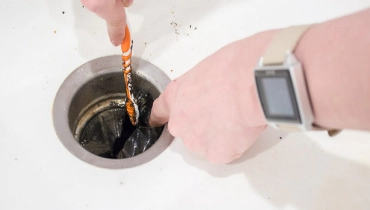
When you’re preparing food in the kitchen, you hope to enjoy mouthwatering aromas of dinner cooking on the stove or dessert baking in the oven. The last thing you want is to detect foul odors from the sink drain. While cleaning your garburator is relatively simple, prevention is always the best cure. Learn why your garbage disposal stinks as well as how to use and maintain the appliance properly to prevent odors in the future.
Why Does My Garburator Smell?
Stinky kitchen sinks are quite common. Here are some possible causes for the odors you detect:
- Decomposing food and grease: Garburators in kitchen sinks make it possible to dispose of food down the drain. This is handy when cleaning up after dinner, but rotting particles left behind in the pipes can produce an offensive odor.
- Mould and bacteria: The top of the rubber strainer flange may look clean, but if you could see the underside, you would be in for a surprise. The warm, moist environment of a kitchen sink drain is perfect for mold and bacteria to grow. Most disposals are full of these microbes, which may be the source of your stinky garbage disposal.
- Sewer gases: All correctly designed and installed sinks feature a trap, which holds water and prevents sewer gases from rising out of the drain. A few problems can cause the trap not to work properly, including a blockage in the drain vent, a leaky vent, or a dried up trap. These issues may allow sewer gases to seep into your kitchen.
How to Prevent a Smelly Garburator
Follow these tips to keep your garburators running smoothly and combat the culprits of stinky kitchen sinks:
- Always run water when operating the disposal to prevent overheating. For this reason, cold water is best.
- Occasionally send ice cubes and lemon peels down the kitchen sink. The first helps to remove gunk from the blades while the second leaves a fresh citrus scent behind.
- Always run the garburators for five seconds after the grinding noise levels out. If you stop the blades prematurely, food particles will be left behind. These could start rotting and produce an unpleasant smell.
- Don’t expect your garburators to “dispose all.” Place inorganic waste, cooking grease, and most food debris in the trash. Be especially careful about potato and carrot peels, corn husks, celery stalks, coffee grounds, and egg shells. These starchy, fibrous items can wrap themselves around the blades and accumulate in the pipes, attracting other particles and increasing odors.
- If sewer smells are coming from the kitchen sink, and sluggish drains and toilets accompany these odors, a blockage in the drain vent could be the source of your trouble. In most homes, the drain vents converge into a single opening on the roof. Climb up there and clear away any leaves or other debris you find clogging the vent.
Professional Garburator Services
If your efforts to treat and prevent a smelly garburators prove fruitless, the problem may be inside the unit. Consider hiring a professional to disconnect, disassemble, and clean the garbage disposal. With a fresh start, you’ll be equipped to start maintaining and operating this small appliance correctly from here on out.
To schedule garburators repair or cleaning, please Contact Mr. Rooter Plumbing today. We offer superior plumbing services at an affordable price. Do your other kitchen appliances need some TLC, too? Let the experts at Mr. Appliance lend a hand.

